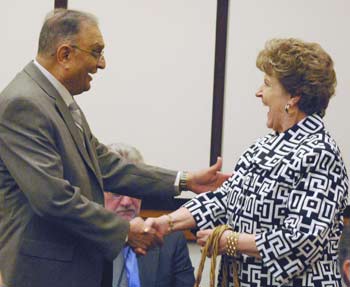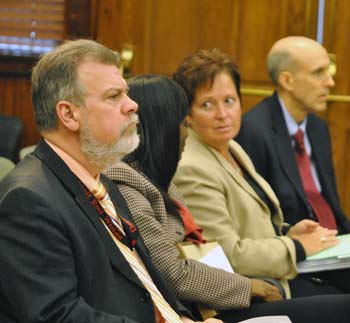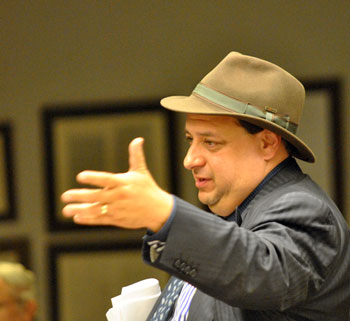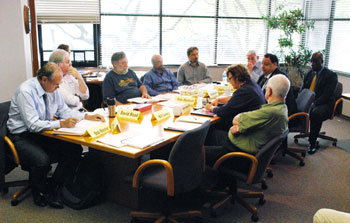Property Values Up, Budget Decisions Loom
Washtenaw County board of commissioners meeting (April 17, 2013): Major budget issues were the focus of the April 17 county board meeting, including news that tax revenues in 2013 will be higher than anticipated.

From left: Raman Patel, Washtenaw County’s equalization director, greets Leila Bauer, chief deputy treasurer who is retiring after 41 years with the county. (Photos by the writer.)
After several years of reporting declining tax revenues, Raman Patel – the county’s equalization director – gave commissioners a report showing stronger signs of economic recovery, reflected in a 1.68% increase in taxable value. That translates into an estimated $2.327 million more in property tax revenues for county government than had been budgeted for 2013. [.pdf of Patel's presentation]
Also related to the budget, commissioners gave initial approval to a four-year budget planning cycle, a change from the current two-year cycle that’s been in place since 1994. Voting against the item was Ronnie Peterson (D-District 6). He and other commissioners expressed a range of concerns, including the fact that commissioners are elected every two years and therefore might not be able to contribute adequately to setting budget priorities. Although Peterson remained unconvinced, several commissioners observed that the annual budget affirmation process acted as a fail-safe, allowing the board to make adjustments based on changing priorities.
Another item that could have a dramatic impact on the county’s budget was only briefly mentioned: A proposal to issue up to $350 million in bonds to fully fund the county’s pension and retiree healthcare plans. It would be by far the largest bond issuance in the county’s history. County administrator Verna McDaniel plans to make a formal presentation about the proposal at the board’s May 2 working session. She distributed materials on April 17 to help commissioners prep for that meeting. [.pdf of bond proposal handout]
Commissioners also took a final vote officially to dissolve a countywide public transit authority known as the Washtenaw Ride. There was no discussion, but Conan Smith (D-District 9) – a vocal advocate for public transit – cast the sole vote against the resolution.
Other action handled by the board included a federal weatherization grant, a public hearing for the Urban County strategic plan, and resolutions honoring county employees and residents. Among them was Leila Bauer, the county’s chief deputy treasurer who is retiring after 41 years with the county. She received a standing ovation from the board. [Full Story]







